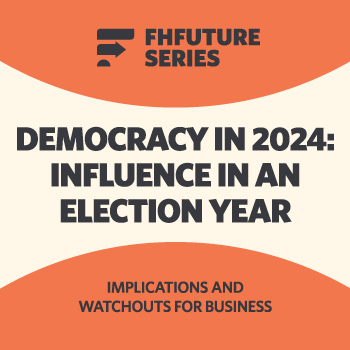We are the 76%: The unholy alliance between the 1% and the 75%
The investor class – the 1% – is waking up and speaking out on a bigger business agenda – purpose. They are joined in their journey by a generation on the ascendancy – the millennials. Why should investors and employers care? Because by 2025 will make up 75% of the world’s working population.
At seventeen I took my first flight. It was to Rome where, despite objections from dad, I was to represent the UK at the European Communist Youth League.
Perhaps it was refrains of “come the revolution”, or references to “comrade” that turned me off, and if my flawless segue into the world of corporate PR wasn’t proof enough, it’s fair to say that since then my politics has changed.
One thing, however, stuck with me. The referential ‘elite’.
Some call them the ‘money-men’, a privileged plutocracy. They are the wealthy investor class and thanks to Occupy Wall Street, they are known as “the one percent”.
The money men, and women, can make or break change. When you move assets with values as long as telephone numbers, your influence is felt.
The difference between the one percent when I was seventeen and now is that, whether they like it or not, they are part of a bigger movement of responsible, value-driven, impact investment.
Last year the value of assets under management (AUM) in ESG – environmental, social and governance – compliant companies was $22.9 trillion. That’s nearly seven Germanies.
Some 96% of institutional investors consider a company’s ESG performance when investing and ESG portfolios have historically outperformed the S&P 500.
The one percent is waking up and speaking out on a bigger business agenda – purpose.
They find common cause with an unlikely generation – the millennials.
The millennial motivation is different to the one per cent. For one we are angry – angry because we will probably earn less than those before us. We have a different view of companies and brands, and having started work in the age of social media and through the fires of the financial crisis, we are used to using our voice. The ambitious social and environmental change our parents’ generation promised has not fully materialised. The difference is, we are committed to doing something about it.
Why should investors and employers care? Because by 2025 will make up 75 per cent of the world’s working population.
Together, albeit unwittingly, with the one percent we have formed an unholy alliance for change. We are the 76%.
This matters to business.
If most people who work for you and buy from you are millennial on the one hand, and huge financial power now rests in the hands conscious investors on the other, the business case for purpose becomes dauntingly stark.
As a socially conscious one percenter you could do worse than finding common cause with the millennials.
Consider this. Some three quarters of millennials would take a pay cut to work at a purposeful company. Around the same look at a company’s environmental, social and governance policies before even considering a job interview. More than nine in ten want to buy products from brands with a social purpose.
If you want to keep the best employees and retain customers, consider your purpose. And when ESG factors are most likely to alter investment decisions for the one percent, your purpose isn’t just good for your brand, it’s critical for your growth.
In a world where climate change agreements are being eviscerated, less than 50 of the Fortune 500 CEOs are women and there are some 40 million modern slaves, it might be the 76% that creates momentum behind change that we all desperately want to see.
Paul Afshar, Head of Purposeful Business
Find Out More
-
Democracy in 2024: Influence in an election year
May 2, 2024
-
Platinum CMS Award
March 13, 2024


